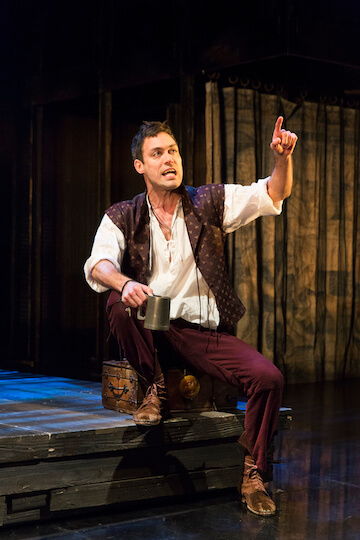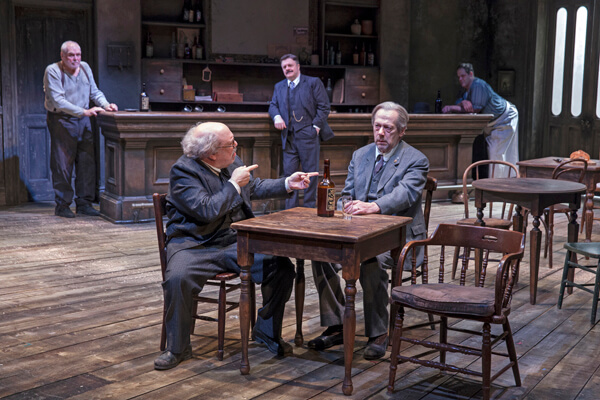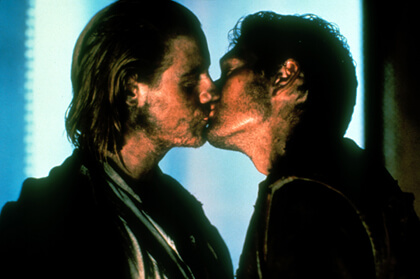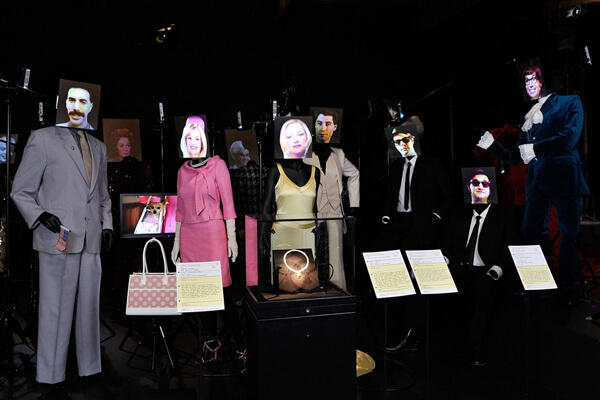BY DAVID NOH | In one of the season’s unquestioned cultural highlights, a true Samuel Beckett master is coming to town. Through April 17, actress Lisa Dwan will be performing a trio of the Irish playwright’s works — “Rockaby,” “Footfalls” and, especially, “Not I,” that punishing monologue wherein the performer’s lips are visible, while her body is strapped to a device which resembles nothing so much as a instrument of torture. It’s a testament to her now almost-legendary performance, as well as to Beckett himself, that Dwan has been enthralling audiences around the world for the last three years with this.
I met the blazingly intelligent — and blazingly beautiful — Dwan at NYU, where I asked if this was actually her ‘Not I’ swan song.
“Yes! I’m hanging up the lips,” she exclaimed. “I first performed this play in 2005 at London’s Royal Court Theatre. Walter Asmus, Beckett’s favorite director, came backstage and offered to direct me in two other plays. So, we’ve been a real team together presenting them as a trilogy. When we opened at the Royal Court again, I didn’t expect them to do as well as they did. It sold out, and transferred to the West End, and I toured all over the world with it.
Lisa Dwan makes the infamous “Not I” her own
“‘Not I’ is the most totally expansive, humbling role. It’s hard to put it down, but it’s good to leave it and preserve it as a really high memory. But it has taken a huge toll on me in a lot of ways.”
When I remarked on how Dwan’s youth and beauty distinguished her from Billie Whitelaw, who formerly owned the role in ‘Not I, ‘ she demurred, “But Billie was so beautiful when she was working with Beckett. I think he was a great admirer of women’s beauty, and what’s gorgeous about him is that when you’re in that sort of pretty girl camp, you can transcend all of that in his work. I’ve expanded myself in so many ways and been so lucky. I worry for my young nieces and the next generation of girls: all of these anorexic role models who take such a frightened little bite out of life. Beckett blows all of that out of the water and offers the most gargantuan landscape for us to stretch our identities in which he presses our noses against the membrane between life and death.”
I observed that beauty can be a prison for an actress, and Dwan agreed: “I started out on TV as the Warrior Princess, but I managed to bound away from the three roles that are offered if you are pretty: blonde, bitch, and bimbo. There’s no more nuance than that, and it’s shocking to go the theater in 2016 where there’s always almost a parody of those characters. And not just in America, but everywhere. It’s still happening, and I feel that there should be a fine for it. It’s a way to control, suppress, and define what kind of identities we’re allowed, because I think the expansiveness of our own natures frightens us. So, we need this. It’s ridiculous, and we have some cheek wagging our finger at the burka when we’re botoxed and starving here. It’s a way of demonstrating our fear.”
I asked her if she was familiar with the Kardashians.
“I hear the word a lot, but I don’t want to engage with it. Most of the things in my life are on a need-to-know basis, and that’s not up there in the pecking order. I find that kind of stuff sickening and not healthy. I’m really trying to detoxify my life because I take big brave decisions and I like things that really challenge me. That just makes me ill.”
I asked Dwan about new roles in her future.
“Oh, there’s loads. And I’m very excited. I’ll share this with you: I’ve just moved to New York permanently and this is day three. Fresh off the boat, but I can’t say I was as stoic as Saoirse Ronan in ‘Brooklyn.’ The guy at immigration said, ‘Welcome to your new home,” and I hadn’t prepared myself for this. My lower lip started trembling and there were tears. It dawned on me that I had just moved home. It’s a frightening city — when I first moved here, I couldn’t look at the panoramic view because it was too intimidating. But it’s very exciting and, because of this Beckett work, I was offered a visa as an alien of extraordinary ability, as well as artist in residence at NYU and Princeton. Your government and institutions have really welcomed me here.”
So have her audiences.
“This is a country that celebrates effort. I did this show at BAM in 2014 for a very limited run, so I was desperate to bring it back and hang up the lips in this town and look for the next opportunity. At BAM, to hear 900 people on their feet was the most shocking thing I ever heard. I remember seeing Fiona Shaw do [Beckett’s] ‘Happy Days’ at BAM. I remember thinking, ‘Wow! Fiona has made it!’ Little did I think that I’d be doing a show on that stage. I didn’t know how to dream that big.
“I, myself, am in no rush to do ‘Happy Days.’ I will. But, right now, I’m more interested in Beckett’s prose pieces and dusting off works of his that have become museum pieces. I will be doing a one-woman show at the Old Vic in September, and bringing it back here. Beckett has changed me profoundly, and I’m really excited to see what happens to me with other writers as a result of the discipline and scrupulous pursuit of the truth which you need for him.”
I really wanted to know about the great Billie Whitelaw, Beckett’s major muse with whom Dwan was friends.
“She didn’t suffer fools and could be very frightening. She was integrity personified, so kind and normal and direct. When Billie spoke, she did it with a kind of arresting gravitas that just stopped you in your tracks. She was so present in her body, her words, and her meaning. Apparently, Beckett was much the same.
“She was also very vulnerable. She could cut you to pieces with a look, but vulnerable at the same time. I had the privilege to meet her in a very intimate way, and we shared what it was like to be in that space only Beckett could take you to. ‘Not I’ had a profound effect on her. She had several nervous breakdowns performing it and it stayed with her for the rest of her life.
“As she was getting more and more isolated and reclusive, out of the woodwork bounds this young, fearless girl who was able to share this with her. We just crossed the divide and greeted each other like long-lost war veterans. I miss her terribly. There were times, in Berlin, when I would be thinking, ‘I’m going to crack. This play is too much!’ I’d ring her, and already she had quite advanced dementia. But, when I rang her, she was there! She had worked with Walter [Asmus]. But I felt like I failed her as a friend because it took me so long to realize her illness. She was so lucid when we talked about the work that I didn’t realize that her grip on the rest of her life had weakened. I would just cry and she would say, ‘I know.’ I’d ring her on opening night — ‘I’m terrified, pray for me.’ And I would take her on stage with me.
“One thing that she did was totally dispel the myths and bullshit about Beckett. I was a very insecure actor then, because I was constantly told, ‘No, you’re a telly actress. You’re blonde. You don’t look like you sound.’ I was washed up at 23 and had to move countries to get work, because people told me I was just a telly actress. I had to be true to myself, triumph, and believe in my own path.
“Billie gave me permission to do that. I remember sitting down with the text of ‘Not I.’ There are a lot of Beckett experts and everyone has a strong opinion, like ‘Beckett doesn’t want actors acting.’ There’s this style that has emerged which is like Noh theater that stifles the work, turning it into museum pieces, all that laying on of hands rubbish.
“I find it very dangerous to do this to work as visceral, accessible, and rich as Beckett’s. Don’t worry about him, though. He’s fine, and humiliates us from the grave when we try all of these affectations. I’ve seen some awful productions and merely think he’s laughing at us, who are the idiots up there.
“Billie saw me having these impulsive and guttural reactions to how the work could be performed, which I was trying to suppress for what it ‘should be.’ She said, ‘What are you doing? Bring it all in. Beckett wanted all that. He wants it to be yours.’
“She gave me permission to use my own domestic landscape, and things started humming. I went home and took out the text of ‘Not I’ and thought ‘that sounds just like my dad. My mum always said that. The nuns were always saying ‘tender mercies.’ That was all okay, creating a vibration of truism and that’s what the audience connected with, not me trying to imitate Billie Whitelaw of the 1970s. It’s about it being totally present and current and going on, so the next person who does it should approach it that way. It has to be theirs, because you can only use your own reality.”
LISA DWAN | Samuel Beckett Trilogy, Through Apr. 16, 8 p.m.: Apr. 16 & 17, 2 p.m. | NYU Skirball Center, 566 LaGuardia Pl. at Washington Sq. S. | $25-$65; nyuskirball.org



































